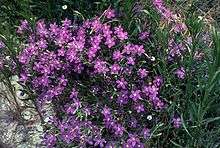Sabatia campestris
| Sabatia campestris | |
|---|---|
 | |
| Scientific classification | |
| Kingdom: | Plantae |
| (unranked): | Angiosperms |
| (unranked): | Eudicots |
| (unranked): | Asterids |
| Order: | Gentianales |
| Family: | Gentianaceae |
| Genus: | Sabatia |
| Species: | S. campestris |
| Binomial name | |
| Sabatia campestris Nutt. 1836 | |
Sabatia campestris (Texas star;[1] also prairie rose-gentian, prairie sabatia, meadow pink[2][3]) is a species of Sabatia, native to the south-central United States, from Texas east to Mississippi and north to Iowa and Illinois.[1] It is also locally naturalized in New England.[4]
Sabatia campestris is an annual plant growing to 15–25 cm (6–10 in) tall with pairs of opposite leaves 8–40 mm long and 5–20 mm wide. The flowers are produced in open, long-stalked cymes at the top of the stems; the flower corolla is about 40 mm diameter, with five pink (rarely white) lobes with bluntly acute apices, and a contrasting bright yellow central 'eye'; they are hermaphrodite (contain both male and female organs). The fruit is a capsule containing numerous small seeds.[5][6]
Habitat
Its natural habitats are mainly fields, prairies (hence the name Prairie rose-gentian), open ground, woods and roadside edges.
Cultivation and uses
Sabatia campestris is cultivated as an ornamental plant in gardens, where it requires moist soil and partial to full sun.
It can be used for medical purposes as an anti-periodic and tonic. It is also possible to obtain a herbal tea from the plant.[2]
References
- 1 2 United States Department of Agriculture Plants Profile: Sabatia campestris
- 1 2 Plants For A Future: Sabatia campestris
- ↑ Noble Foundation Plant Images: Sabatia campestris
- ↑ Enser, R. W. (2004). New England Plant Conservation Program Sabatia stellaris Pursh (Sea pink) Conservation and Research Plan for New England pdf file
- ↑ Herbarium of Louisiana State University: Sabatia campestris collections
- ↑ Pringle, J. S., & Witsell, T. (2005). A new species of Sabatia (Gentianaceae) from Saline County, Arkansas. Sida 21 (3): 1249-1262 pdf file
- photo of herbarium specimen at Missouri Botanical Garden, collected in the Republic of Texas in 1843